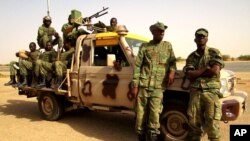UNITED NATIONS —
The U.N. Security Council has given the green light for the transition from an African-led support mission in Mali to a full-fledged U.N. peacekeeping force.
In April, the Security Council authorized the transition from the 6,000-strong African force known as AFISMA, which deployed to Mali in January, to become a U.N. peacekeeping mission on July 1, as long as security conditions are conducive for the transfer of authority.
On Tuesday, British Ambassador Mark Lyall Grant, who chairs the council this month, told reporters that members believe the country is ready for such a mission.
“There was unanimous agreement by Security Council members that we should move to the next phase of Mali’s recovery with the deployment of MINUSMA from the first of July," said Lyall Grant.
MINUSMA is the acronym by which the U.N. Stabilization mission is known.
U.N. peacekeeping chief Hervé Ladsous told the council that MINUSMA will be the United Nations' third largest peacekeeping mission once its more than 12,000 military and police personnel are fully deployed by the end of this year.
The bulk of the troops will be based in the north, where armed groups led a rebellion and seized control earlier this year. MINUSMA will also maintain a limited presence in the capital, Bamako.
Ladsous said MINUSMA will play a key role in the stabilization of Mali and the protection of citizens.
“Our central priority will be to maintain a seamless continuity between the two operations [AFISMA and MINUSMA] to preserve the security gains made so far and avoid creating any security vacuums whilst supporting elections and the cease-fire agreement," said Ladsous.
Mali is planning presidential elections for July 28. Ladsous warned that a poorly managed electoral process could further aggravate instability. He said the mission would provide logistical and technical assistance as well as security arrangements for the vote.
The peacekeeping chief said MINUSMA is still in need of critical equipment such as helicopters, intelligence, information operations and Special Forces. Some equipment and assets are currently being borrowed from other U.N. missions.
In January, French forces intervened in Mali at the request of the government. They are winding down their operations now and France’s U.N. ambassador, Gérard Araud, told reporters that Paris hopes to have only about 1,000 troops in the country by the end of the year, down from about 3,000 now.
In April, the Security Council authorized the transition from the 6,000-strong African force known as AFISMA, which deployed to Mali in January, to become a U.N. peacekeeping mission on July 1, as long as security conditions are conducive for the transfer of authority.
On Tuesday, British Ambassador Mark Lyall Grant, who chairs the council this month, told reporters that members believe the country is ready for such a mission.
“There was unanimous agreement by Security Council members that we should move to the next phase of Mali’s recovery with the deployment of MINUSMA from the first of July," said Lyall Grant.
MINUSMA is the acronym by which the U.N. Stabilization mission is known.
U.N. peacekeeping chief Hervé Ladsous told the council that MINUSMA will be the United Nations' third largest peacekeeping mission once its more than 12,000 military and police personnel are fully deployed by the end of this year.
The bulk of the troops will be based in the north, where armed groups led a rebellion and seized control earlier this year. MINUSMA will also maintain a limited presence in the capital, Bamako.
Ladsous said MINUSMA will play a key role in the stabilization of Mali and the protection of citizens.
“Our central priority will be to maintain a seamless continuity between the two operations [AFISMA and MINUSMA] to preserve the security gains made so far and avoid creating any security vacuums whilst supporting elections and the cease-fire agreement," said Ladsous.
Mali is planning presidential elections for July 28. Ladsous warned that a poorly managed electoral process could further aggravate instability. He said the mission would provide logistical and technical assistance as well as security arrangements for the vote.
The peacekeeping chief said MINUSMA is still in need of critical equipment such as helicopters, intelligence, information operations and Special Forces. Some equipment and assets are currently being borrowed from other U.N. missions.
In January, French forces intervened in Mali at the request of the government. They are winding down their operations now and France’s U.N. ambassador, Gérard Araud, told reporters that Paris hopes to have only about 1,000 troops in the country by the end of the year, down from about 3,000 now.




